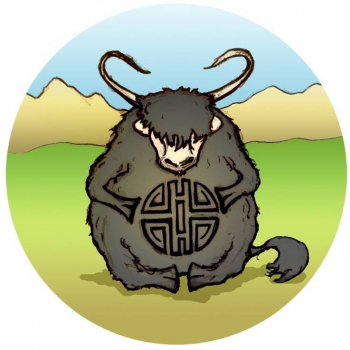The Big Steppe
School of Global Studies, One World Week events 19 - 23 March 2018
The Big Steppe team are a group of researchers, documentarians and artists who have recently returned from an expedition to Mongolia where we were researching experiences of rural to urban migration.
 In Mongolia, many people have been making the decision to migrate; from a nomadic life in the countryside to peri-urban areas or larger towns, and from these towns to the city. The decision to make this move cannot be reduced to a single cause, as there are many ‘push’ and ‘pull’ factors that influence the choice to move. For some people, the decision to migrate stems from the desire for a better education, or to be closer to more advanced medical facilities or hospitals. For others, the drive to have access to more opportunities for waged labour is the pull that influenced them to migrate. For most, it is a combination of factors that result in their migration. However, climate change has now become a major factor for households living on the Mongolian steppe. Over the past seventy years, the average temperature in Mongolia has risen by 2.07 degrees. This is more than double the average global increase over the past century. Climate change is affecting people’s capacity to cope or maintain their wellbeing, especially when it interacts with other ‘push’ forces, which may include poor health, insufficient market prices for livestock goods, or conflict over land and resources.
In Mongolia, many people have been making the decision to migrate; from a nomadic life in the countryside to peri-urban areas or larger towns, and from these towns to the city. The decision to make this move cannot be reduced to a single cause, as there are many ‘push’ and ‘pull’ factors that influence the choice to move. For some people, the decision to migrate stems from the desire for a better education, or to be closer to more advanced medical facilities or hospitals. For others, the drive to have access to more opportunities for waged labour is the pull that influenced them to migrate. For most, it is a combination of factors that result in their migration. However, climate change has now become a major factor for households living on the Mongolian steppe. Over the past seventy years, the average temperature in Mongolia has risen by 2.07 degrees. This is more than double the average global increase over the past century. Climate change is affecting people’s capacity to cope or maintain their wellbeing, especially when it interacts with other ‘push’ forces, which may include poor health, insufficient market prices for livestock goods, or conflict over land and resources.
To better understand the experiences of those who have already migrated to urban areas, our research also focused on one of the most notable destinations for people who migrate from rural to urban spaces; Ulaanbaatar (UB), Mongolia’s capital city. Around 47 percent of the country’s three million inhabitants live here, and 60 percent of these people live in the ‘Ger areas’. Ger areas are districts of largely informal settlements and dwellings distributed around the northern periphery of the city. Comprised mostly of traditional Gers (the Mongolian name for Yurt), these are continually expanding areas as more people make the decision to migrate to the country’s capital. The fact that the government recently issued a moratorium on new migrants registering in the city is testament to the challenges that human migration is presenting at a governmental level.
It became evident to us that although many people who live in these districts migrated in search of better healthcare, education, or job opportunities, such advancements in their wellbeing have not materialised. Many of the residents in ger areas remain unregistered in the city, and as a result do not have the right papers to access healthcare or education. Well-paid jobs require skills that many people do not possess. Public facilities are overrun, and access to the available facilities are frequently determined by relative wealth and power.
With a lack of state support for existing ger area residents, attempts to prevent people from migrating to UB through the government’s moratorium on new applications for citizenship may appear like a sensible decision. But with little assistance available for Mongolia’s rural communities, there are limited options left for a population wrestling with ‘modernity’ and a shifting climate. Political and social change has left many Mongolians less able to deal with such dramatic shifts, and so internal migration may not be the preferred step to take but may just be a means of adaptation that they have little choice but to take.
The Big Steppe Team: Molly Atkins, Anoushka Carter, Hattie Field, Sean Lovell and Bob Walley.
Additional photo credit: Matthew Emslie-Smith
For more information please visit: noticethenomads.weebly.com or www.facebook.com/thebigsteppe
We would like to take this opportunity to show our warmest gratitude to Bujindei Ankhbayar, Davaa Baasan, Enkhtaivan BuBu, Bolormunkh Erdenekhuu, Temuujin Nyamdavaa, Nara and The Mongolian Red Cross Society. Our greatest thanks to all the humble and inspirational Mongolian people who wanted to be involved in our research project, trusted us, and allowed us to learn about their lives.


